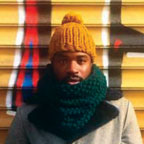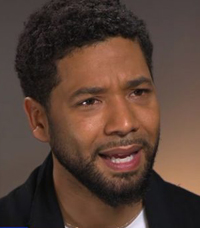
 Not leaving anyone out: Tackling HIV criminalization as a racial justice and public health priority
Not leaving anyone out: Tackling HIV criminalization as a racial justice and public health priority
Darnell Moore of Mic.com and Black Lives Matter.
By Victoria Law, From TheBody.com
The Black Lives Matter movement has catapulted the problem of state violence against African American people onto the national consciousness. Across the United States, organizers and activists have disrupted business as usual to remind people about the systematic violence against Black people, whether in the form of police brutality, over-policing or mass incarceration. And for HIV advocates involved in the movement, HIV criminalization is another aspect of the structure of racial violence.
“We have to see HIV criminalization as similar to the bullet coming out of a police officer’s gun,” declared Darnell Moore, a senior editor at Mic and Black Lives Matter organizer. “If we are thinking about state and state-sanctioned violence, then we have to see HIV criminalization as another route to do this.”
Deon Haywood is the executive director of Women With a Vision (WWAV), a New Orleans organization of African American women organizing in response to HIV/AIDS in communities of color. She has been organizing around the intersections of race, gender and HIV for the past 20 years. She remembers long, lonely years when politicians, health officials and the general public ignored these issues “because it was just Black people screaming about it.”
She says that criminalization — of HIV, sex work and Black people — is now on the public radar, but she emphasizes the need for an intersectional analysis rather than a silo approach.
“You cannot talk about one form of criminalization without talking about the others,” she told TheBody.com. “You can’t talk about HIV criminalization without talking about race, without talking about access and without talking about privilege.”
Advocates say that last year’s prosecution and conviction of Michael Johnson shows that, like other forms of criminalization, the brunt falls on the most marginalized — namely low-income people of color, particularly black people.
In May 2015, Johnson, a 23-year-old student at Linwood University in Missouri, was convicted under the state’s HIV criminalization laws and sentenced to 30 years in prison. Johnson is a Black, gay man. All but one juror were white; several believed that homosexuality is a sin.
Panic Around HIV
What happened to Johnson is only one example of how racism and homophobia collide with HIV panic to criminalize people of color.
In California, Blacks and Latinos make up half of people living with HIV, but two-thirds of those who are caught up in the state’s criminal justice system because of their status. A recent report by the Williams Institute demonstrates how race plays a deciding factor in who is prosecuted — and who gets to go home without charges.
Between 1988 and 2014, at least 800 people were picked up by police due to their HIV status. The vast majority were either engaged or suspected of being engaged in sex work. But white men were more likely to be released without charge than Black people of any gender. Nearly every incident in which charges were filed (389 out of 390) resulted in a conviction; 91 percent were sent to prison or jail for an average of 27 months.
In that state, white men compose 40 percent of people diagnosed with HIV — but only 16 percent of those who encountered the criminal justice system because of their HIV status. In contrast, Black women compose 4 percent of people diagnosed with HIV, but 21 percent of those who have had criminal justice encounters because of their status.
Haywood notes that, in Louisiana, the people with whom WWAV works — mostly Black cis and trans women — fall into the crosshairs of several types of criminalization. She recounts one woman who called the police on her live-in boyfriend. Under state law, police must make an arrest if they believe that abuse has occurred. But in this woman’s case, the police wanted to arrest both parties. The woman, who has HIV, said that she needed her medication. When the police learned that the medication was for HIV, they arrested and charged her with intentional exposure. It didn’t matter that her boyfriend told officers that he knew his girlfriend’s status and that he did not want her charged. And, according to Haywood, this case is not an exception; WWAV has had other clients in similar situations.
For Haywood, HIV criminalization does not stand on its own. “It’s also the way that people are targeted by police and how police use issues that are really public health issues [such as HIV and drug use] to criminalize people further,” she stated.
Advocates Moving Forward
Thankfully, Haywood is no longer one of the few working on these intersections. In October 2015, Counter Narrative Project, Black Youth Project (BYP100), HIV Prevention Justice Alliance, and the Positive Women’s Network – USA convened a webinar in which organizers offered recommendations to advance solidarity between Black Lives Matter and HIV decriminalization.
The interconnection of race and HIV criminalization will be also considered by advocates at the next big convening around HIV criminalization, which will take place in the South. In May 2016, the second national HIV is Not a Crime conference will be held in Huntsville, Alabama. Continuing its work from the 2014 conference, the three-day conference will connect and train advocates living with HIV and their allies on strategies and best practices for repealing HIV criminalization laws. For those interested, the conference offers a limited number of scholarships. Applications are due Feb. 5, 2016.
But this won’t be the first time a national gathering drew the focus of activists at the intersection of HIV criminalization and racial justice. In July 2015, hundreds of people converged in Cleveland for the inaugural convening of the Movement for Black Lives. The convening included several workshops about the intersections of race and HIV criminalization. One covered the history of Black AIDS activists while another focused on queer Black activists. A third, entitled “HIV: Is It a Crime or Not?” offered information about criminalization laws and their ramifications.
But, noted Moore, the learning curve around HIV criminalization remains steep. “It’s hard for people to think about HIV. They’re not ready to talk about sex, consent and disclosure. Many of us are not ready to have these conversations.”
These conversations need to be had. According to the Centers for Disease Control and Prevention, the rate of new HIV infections among African Americans is eight times that of their white counterparts. In addition, neither racial profiling nor HIV criminalization are ending anytime soon.
Priorities in the Year Ahead
What can be done to strengthen the connections between racial justice organizing and ending HIV criminalization in the year ahead? How can advocates fighting to end racist state violence, the criminalization of sex workers and the criminalization of HIV connect their struggles?
“Eliminate these HIV exposure laws,” declared Waheedah Shabazz-El, a founding member of the Positive Women’s Network, an advocacy network of women living with HIV.
Studies now prove that effective antiretroviral therapy can reduce the risk of HIV transmission to close to zero — but the legal system has yet to catch up. Advocates need to engage the community and ensure that prosecutors, judges and public defenders are educated about breakthroughs in medicine. This means pressuring state and county health departments to disseminate information and roping them into action when prosecutions occur. After all, Shabazz-El pointed out, the federal government has labeled HIV a “manageable” disease (particularly when it wants to cut HIV funding). But prosecutors ignore this designation, continuing to play on fears to push for prison sentences.
These fears also make disclosure much more dangerous. As a woman living with HIV,




Be the first to comment